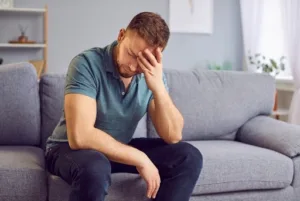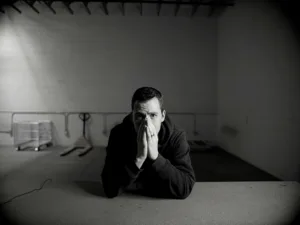It’s no secret that men are feeling increasingly isolated and lonely. This can have serious negative effects on their mental and physical health. Many men are turning to group therapy to connect with other men. At Denver Men’s Therapy, we believe group therapy is a unique opportunity for men to connect, learn, and grow with other men while fostering accountability. Group therapy often involves a therapist working with a small group of men facing similar challenges, men’s groups in Denver offer a unique and supportive environment for personal growth. Many men find solace and strength in the camaraderie and shared experiences within these groups, often preferring them over individual therapy sessions. By coming together in a support group with like-minded peers, men can address common issues while fostering a sense of community and understanding. If you’re seeking a safe space to explore personal development and connect with others on a deeper level, joining a men’s group could be the transformative step you’ve been looking for.
Exploring Therapy Groups for Men
Supportive Environment
Groups provide space to engage with fellow men in a safe and supportive environment. These group therapy settings provide men the opportunity to share experiences and challenges related to male-specific issues like male depression, relationships, masculinity, and fatherhood.
Therapy groups offer a unique platform where men can openly discuss their struggles without fear of judgment or stigma. According to Andy Caraway, LPC, Denver Men’s Thearpy’s group therapist, “Men’s groups are an excellent vehicle to deliver safe spaces to process issues along with camaraderie.” Men’s groups foster a sense of belonging and understanding among participants, creating a supportive community for individuals facing similar obstacles.
Professional Guidance
Mental health therapists led group therapy sessions. Male group participants receive male guidance from experienced therapists who specialize in addressing men’s mental health concerns. These professionals offer valuable insights and tools to help cultivate individual masculinity and navigate through personal growth journeys within the group setting.
The guidance provided by therapists is tailored to meet the specific needs of men, focusing on developing emotional intelligence, communication skills, self-care and coping mechanisms. Through this mentorship, individuals can explore new perspectives, challenge harmful beliefs, and embark on a journey toward holistic well-being.
Peer Support and Relationships
Participate in process groups designed specifically for adult men seeking peer support and connection. Men can learn from one another as they share their wisdom and experiences with the group. These groups enable individuals to build meaningful relationships with others while addressing various mental health challenges in a collaborative setting.
Peer support plays a crucial role in fostering resilience and promoting emotional wellness among men. By sharing experiences, offering empathy, and providing encouragement, group members create a supportive network that enhances each individual’s healing journey. This process is a powerful way men can learn to relate to others in a meaningful way.
Benefits of Men’s Group Therapy
Male Guidance
Receive male guidance and support from fellow men in a safe, non-judgmental space. This setting, a group, allows for open discussions about personal challenges and experiences. “Men’s groups can be an integral part of psychological growth and development, ” Says Caraway.
Role Model
Men’s groups offer the opportunity for men to role model healthy ways of coping or solving life challenges. The wisdom that comes from life experiences can be a powerful tool in the group dynamic.
Healthy Masculinity
In group psychotherapy, delve into the concept of healthy masculinity. The group can explore how there is no single way to express masculinity. The group supports men in developing their own masculinity that works for them. Groups offer men the chance to be helpful to others and experience being supported in their masculine journey. Groups provide men the opportunity to explore ways to define what masculinity means to each group member.
Unique Aspects of Group Therapy for Men
Experiential Therapy
Experiential therapy in men’s groups in Denver involves hands-on activities to explore emotions and address underlying issues like trauma and anxiety. This approach helps men process their feelings in a tangible way, promoting healing and personal growth.
Cultivating Resilience
Through group therapy, men have a unique opportunity to cultivate resilience by learning from each other’s experiences. Navigating shared challenges together strengthens their ability to cope with adversity, promoting long-term emotional well-being.
Encouraging Men Towards Therapy
Meeting The Needs Of Men
Men’s groups in Denver play a crucial role in encouraging men to seek psychotherapy. Many men prefer group therapy to individual therapy. By creating a safe space for discussions, men can openly address their struggles with depression, addiction, and other mental health issues. This group environment provides men with the opportunity to improve their mental health symptoms in a setting that is comfortable for them.
Group Therapy Works
Group Therapy is as effective as individual therapy. It is also more cost-efficient because there is only one therapist running the group. Participation in men’s group therapy offers an affordable way to improve mental health.
Success Stories
- Men who have engaged in therapy often report improved mental well-being.
- Through therapy, individuals learn effective coping mechanisms for dealing with stress and emotional turmoil.
- Therapy has helped many men overcome addiction issues and live healthier, more fulfilling lives.
Addressing Barriers
- Traditional Gender Norms: Men are often taught to suppress their emotions, making it challenging to seek help. Therapists work on dismantling these norms and encouraging emotional expression.
- Fear of Judgement: Many men fear being judged for seeking therapy. Creating a non-judgmental environment within men’s groups helps alleviate this concern.
- Lack of Awareness: Some men may not be aware of the benefits of therapy or how to access it. Educational initiatives within communities can raise awareness about available resources.
Preparing for Group Therapy: A Guide for Men
Seeking Male Guidance
Men often face challenges that require seeking male guidance and support from fellow men. In a safe space, they can address issues related to masculinity, trauma, and relationship problems.
Benefits of Group Therapy
Joining a men’s group offers a supportive community where individuals can engage in experiential therapy. Led by therapists, these sessions function as a process group, aiding in working through personal challenges.
Mental Preparation for Group Sessions
Before attending group therapy, it is crucial to mentally prepare by understanding the dynamics of group interactions. Recognizing the therapist’s role in creating a supportive environment fosters openness and trust among participants.
Embracing Healthy Masculinity
Emphasizing the importance of embracing healthy masculinity within the group setting is key to fostering camaraderie. This approach encourages mutual understanding among fellow men, promoting growth and healing.
Building Relationships and Resilience
Importance of Relationships
Building strong relationships is crucial for men’s mental health as it provides social support and a sense of belonging. These interactions help in healing from past traumas and navigating through life’s challenges.
Establishing open relationships within men’s groups in Denver fosters a safe space for individuals to share their experiences openly. This sharing promotes growth by learning from others’ journeys and gaining new perspectives.
Strategies for Resilience
Men facing challenges can enhance their resilience by developing new behaviors and coping skills within the group setting. By focusing on personal growth, individuals can work towards transformation and overcoming obstacles effectively.
In these groups, members are encouraged to hold each other accountable for their actions, fostering a culture of accountability that supports positive change. This collective effort empowers individuals to tackle difficulties with a renewed sense of determination.
Role of Social Support
The role of social support in men’s mental health cannot be understated. Being part of a supportive community provides individuals with the necessary tools to navigate through life’s ups and downs effectively.
Through shared experiences and emotional connections, men in these groups can address underlying issues and work on managing their emotions constructively. This emotional focus on well-being helps in creating a more balanced and fulfilling life.
Summary
You’ve delved into the world of men’s group therapy, understanding its benefits, unique aspects, and the process involved. By exploring therapy groups tailored for men in Denver, you’ve gained insights into how these spaces foster resilience and meaningful relationships. Take the step towards therapy; it’s a path to self-discovery and growth.
Frequently Asked Questions
What are the benefits of joining a men’s therapy group in Denver, especially for addressing toxic masculinity, depression, and relationship issues with a therapist?
Joining a men’s therapy group in Denver can provide a supportive environment, promote personal growth, enhance communication skills, and offer a sense of community among like-minded individuals seeking to improve their mental well-being.
How are men’s therapy groups in Denver different from individual therapy sessions?
Men’s therapy groups in Denver offer the opportunity for shared experiences, peer support, and learning from others facing similar challenges. Unlike individual therapy, group sessions foster connections and provide diverse perspectives on common issues.
Is group therapy effective for men dealing with mental health issues?
Yes, group therapy has been proven effective for men dealing with various mental health concerns. Through sharing experiences, gaining insights from peers, and receiving support from fellow group members, men can develop coping strategies and improve their emotional well-being.
How can men benefit from building relationships through therapy groups?
Building relationships within therapy groups can help men feel understood, reduce feelings of isolation, boost self-esteem, learn new perspectives on their struggles, and develop healthier ways of relating to others both within and outside the group setting.
What is the process of joining a men’s therapy group in Denver like?
To join a men’s therapy group in Denver, individuals typically start by contacting the facilitator or organization running the group. They may undergo an initial assessment to ensure compatibility with the group dynamics before attending regular sessions focused on specific themes or topics.
Men’s Therapy Groups in Denver
Benefits
Denver Men’s Therapy has men’s groups that offer a supportive environment for individuals facing various challenges. These groups provide a sense of community and understanding among participants.
Men’s therapy groups in Denver focus on promoting mental well-being by encouraging open discussions and sharing experiences. Participants often find comfort in knowing they are not alone in their struggles.
Structure
In these therapy groups, members engage in group activities and discussions facilitated by experienced therapists. The sessions typically last for around 90 minutes and occur weekly or bi-weekly.
The structured format of the men’s groups allows individuals to explore their emotions and develop coping strategies in a safe space. This setup fosters empathy and mutual support among participants.
Confidentiality
One key aspect of Denver Men’s Therapy groups is the emphasis on confidentiality. Members are encouraged to share openly, knowing that what is discussed within the group remains confidential.
Confidentiality creates a safe space for men to express themselves without fear of judgment or repercussions. This trust dynamic enhances the effectiveness of the therapy process.
Understanding the Group Therapy Process
Therapists’ Role
Therapists play a crucial role in facilitating group therapy sessions by providing guidance and creating a safe space for participants to share their experiences. They help maintain a balance between allowing organic interactions and steering the group towards therapeutic goals.
Experiential Therapy Benefits
Experiential therapy, a form of psychotherapy, offers hands-on activities to help individuals explore and address deep-seated emotions and behaviors. In a supportive community setting, this approach fosters emotional healing and personal growth.
Peer Support and Interactions
Interactions among group members and peer support are integral aspects of the healing process in men’s therapy groups. Sharing similar experiences creates a sense of belonging and validation, promoting emotional connection and understanding.
Transformation and Accountability
Group therapy provides a platform for profound transformation, allowing individuals to confront past traumas, develop coping strategies, and build resilience. The accountability within the group encourages personal growth and fosters a sense of responsibility towards oneself and others.
Key Takeaways
- Consider joining a men’s therapy group in Denver: Explore the benefits of group therapy tailored specifically for men in a supportive environment.
- Embrace the unique aspects of group therapy for men: Recognize the value of shared experiences, camaraderie, and mutual support that can enhance personal growth and well-being.
- Encourage men to prioritize their mental health: Advocate for destigmatizing therapy and promoting emotional well-being among men to create a healthier community.
- Prepare for group therapy by setting intentions: Take proactive steps to mentally and emotionally prepare for group sessions, fostering a positive and open mindset.
- Focus on building relationships and resilience: Cultivate meaningful connections with other group members and develop coping strategies to navigate life’s challenges effectively.
- Explore available men’s therapy groups in Denver: Research and reach out to local resources that offer group therapy options tailored to men’s specific needs and concerns.






